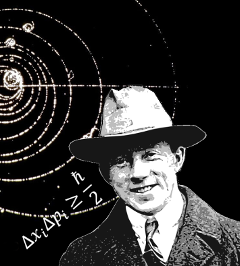Tests to find we can really know in weird quantum world
 A team from the University of Queensland is not so sure about Heisenberg’s uncertainty principle.
A team from the University of Queensland is not so sure about Heisenberg’s uncertainty principle.
A group of physicists is challenging the long-held notion by measuring quantum particles with unprecedented accuracy.
The classic Heisenberg principle states that it is not possible to measure two incompatible quantities at the same time.
For example, the principle suggests it is impossible to simultaneously tell the speed and location of a quantum particle with perfect accuracy.
With new instruments, new knowledge and new approaches, the UQ team is finding just how much they can know about a quantum element before running up against Heisenberg’s near century-old prediction
The researchers say they have performed joint measurements on single photons, challenging the fundamental limits of quantum theory.
“The uncertainty principle is one of the central features of quantum mechanics, which has been misunderstood for the longest time,” Mr Martin Ringbauer, a PhD student at UQ’s School of Mathematics and Physics said.
“This experimental work settles a decade-long debate — ‘Heisenberg-like’ relations do not hold for joint measurements.
“Now that we have a complete theory, as well as experimental evidence, it is probably time to update the textbooks,” Mr Ringbauer said.
The PhD student is also the lead author of an experimental study published by the American Physical Society.
The current experiments are based on the work of UQ’s Cyril Branciard, who proposed a new set of “uncertainty relations” to measure incompatible quantities.
“Branciard’s relations quantify how accurately we can measure,” Mr Ringbauer said.
“Testing these relations, we are now able to show in the lab that we can actually reach this ultimate limit of accuracy,” he added.
Related work in the same journal has come upon a similar result.
Enhancing the measurable aspects of quantum systems has far-reaching applications for science, which is moving further into the study and actual use of quantum mechanics in research and development worldwide.







 Print
Print